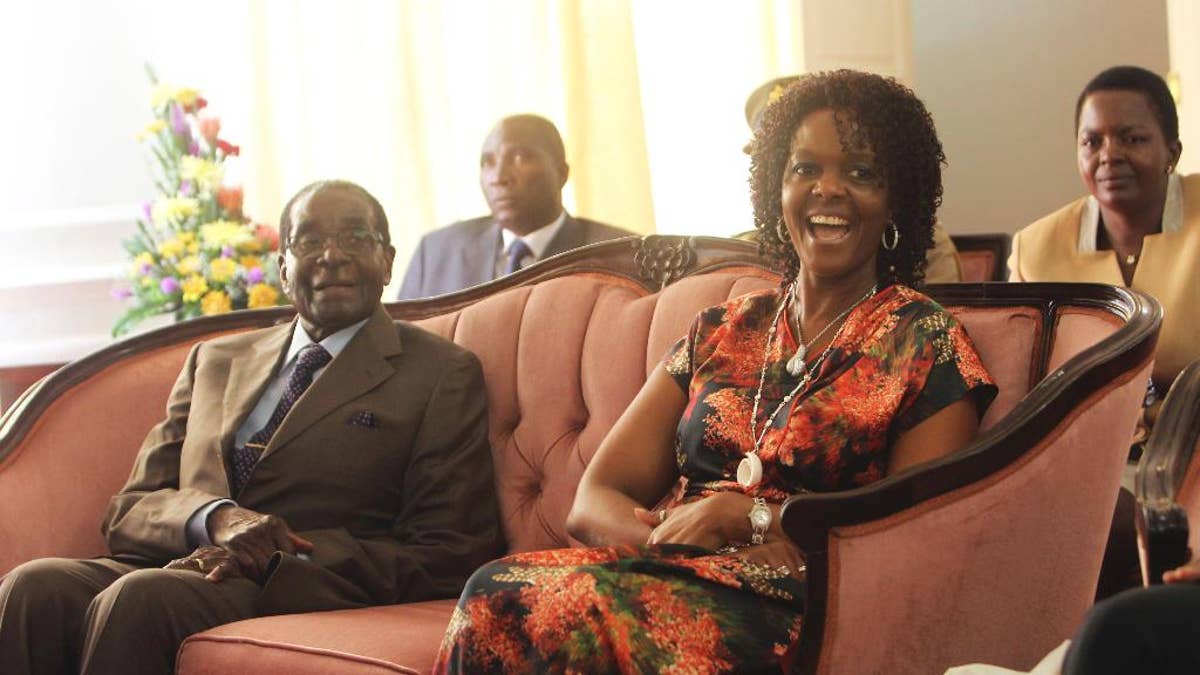
Zimbabwe's President Robert Mugabe and his wife Grace are seen during a birthday party for him in Harare, Feb, 22, 2016. (Associated Press)
Zimbabwe’s first lady, Grace Mugabe, arrived home in Harare on Sunday – but that doesn’t mean the controversy she’s linked to in South Africa has died down.
In fact, it may be just beginning.
Mugabe, wife of Zimbabwe’s longtime ruler, 93-year-old Robert Mugabe, is accused of beating a woman with an extension cord Aug. 13 during a trip to Johannesburg.
Some in South Africa say Mrs. Mugabe should return and face assault charges.
The victim, Gabriella Engels, a 20-year-old model, claims she suffered a cut to her forehead. Photos in the media have shown Engels with a sizable gash above her left eye, or wearing a large bandage.
But the Mugabe camp has counterclaimed that Engels received the wound during a nightclub brawl, News24.com reported.
Engels said the alleged beating took place at a luxury hotel in Johannesburg, where the Mugabes were staying during an African summit meeting that the Zimbabwean president was attending in Pretoria.
Engels said Grace Mugabe entered a room, possibly looking for her two sons.
“She kept screaming, asking where her son was. The more we tried to explain they might be elsewhere in the hotel [but not with us], the less she wanted to believe it,” Engels told the South African newspaper Rapport. “The next thing she hit my friend who was closest to her with the cord. She ran away and then she started hitting me.”
Engels claims she was struck multiple times, adding that Mugabe hit her “with the sharp side of the extension cord’s plug for what seemed like forever.”
As word spread of Engels' claim, some protesters gathered in Pretoria and chanted, "Grace is a disgrace."
The South African government said Saturday that it was deciding whether to grant diplomatic immunity to Grace Mugabe at the request of the Zimbabwean government, though there was no immediate comment from South African authorities Sunday.
But a security source told the Guardian that diplomatic immunity was granted.
A group representing Engels said they would go to court to challenge the South African government if Mugabe received immunity.
“We will take a long-term approach on this,” said Willie Spies, legal representative at AfriForum, an organization that primarily represents South Africa’s white Afrikaner minority.
"She may be back in Zimbabwe, but it may mean that she will find it very difficult to come back to South Africa in the future.”
Zimbabwe’s outspoken first lady has long been criticized for a fiery temper and lavish shopping expeditions, but her rising political profile has some asking whether she is maneuvering to succeed her husband.
She recently said Zimbabwe's ruling party should restore a constitutional provision stating that one of the party’s vice presidents should be a woman, and has publicly challenged her husband to name a successor.
President Mugabe was expected to preside at a state funeral for a former minister in Harare on Sunday; it was unclear whether his wife will attend.
Meanwhile, amid the controversy surrounding Grace Mugabe, Zimbabwe and South Africa engaged in what seemed like an air-traffic tit-for-tat: Zimbabwe blocked flights by South Africa’s government-owned airline on Saturday after an Air Zimbabwe flight was grounded at Johannesburg’s main international airport the previous evening.
Both countries said they imposed restrictions because the planes did not have a “foreign operator’s permit.”
The Associated Press and AP writer Christopher Torchia contributed to this report from Johannesburg.
